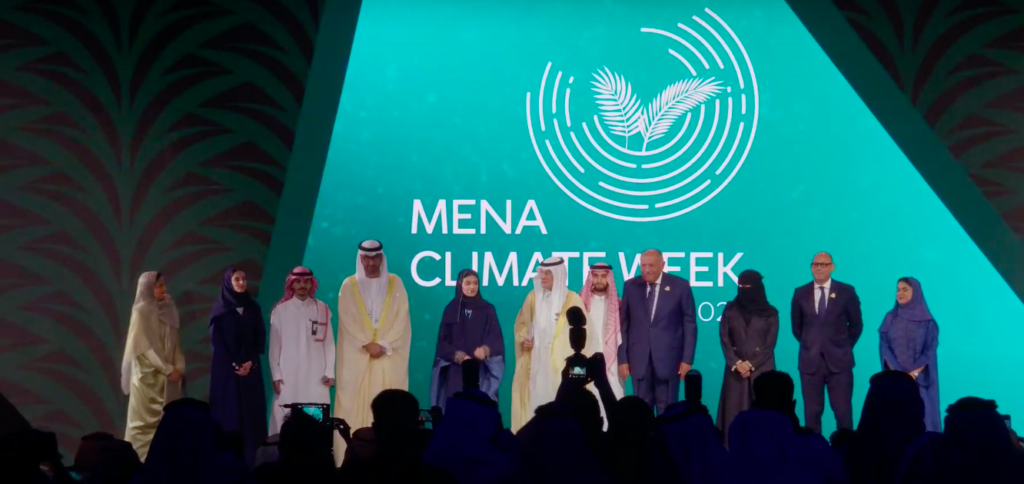MENA Climate Week

MENA Climate Week 2022. Photo: Youtube
By: Joud Sleilaty / Arab America Contributing Writer
In a world dealing with the consequences of climate change, the second-ever Middle East and North Africa (MENA) Climate Week opened on the 8th of October, 2023, with a resolute mission – to address the unique challenges and explore innovative solutions in a region that stands among the most vulnerable to the impacts of a changing climate. Hosted by the government of the Kingdom of Saudi Arabia, this five-day event held in Riyadh promises to play a pivotal role in shaping global climate action and contributing to the year-end UN Climate Change Conference, COP28, in Dubai. The discussions at MENA Climate Week are set to influence the global stocktake and accelerate the implementation of the Paris Agreement, offering a ray of hope in the face of a daunting climate crisis.
MENA in Peril
The entire MENA region is a climate change hotspot, with climate models predicting temperatures 20% higher than the global average. This alarming increase in temperature poses a severe threat, especially when considering that the MENA region is already the most water-scarce area on the planet. The dire situation is expected to worsen, leading to more frequent and severe droughts. More than 60% of the region’s population lacks access to clean drinking water, while a staggering 70% of their Gross Domestic Product (GDP) remains vulnerable to water stress. With 70% of agricultural production relying on rain-fed practices, any changes in temperature and precipitation patterns due to climate change are bound to have dire consequences.
Rising to the Challenge
However, amidst the crisis, the MENA region also has the potential to become a global leader when it comes to renewable energy and technologies. By attracting investments and facilitating technology transfers, MENA nations can lead the way to a greener, more sustainable future. The Circular Carbon Economy approach, endorsed by HRH Prince Abdulaziz bin Salman, Saudi Arabia’s Minister of Energy, promotes the use of all available technologies, forms of energy, and mitigation opportunities to achieve climate goals. This approach can transform the region’s economies, solidify its position in the global green transition, and offer a blueprint for the rest of the world.
As Simon Stiell, the Executive Secretary of UN Climate Change, has underscored, MENA Climate Week serves as the ideal platform for highlighting regional solutions and innovations. This spotlight not only sheds light on MENA’s potential but also fosters collaboration transcending borders, sectors, and disciplines. It shows that MENA’s climate efforts can inspire worldwide collaboration, making it a global example for a sustainable future.
A Call for Immediate Action
Inger Andersen, Executive Director of the UN Environment Programme (UNEP), emphasized the urgency of addressing climate change. She stated, “Climate change isn’t a threat waiting around the corner – the MENA region knows this from first-hand experience with fierce heatwaves and water shortages.” Andersen called upon participants to harness innovation and inspire transformative action. She reminded everyone that every fraction of a degree matters, and collective action is essential to avert the worst consequences of climate change.
The Broader Impact of Climate Change
Abdallah Al Dardari, UN Assistant Secretary-General and UNDP Director of the Regional Bureau for Arab States, highlighted how climate change, environmental degradation, and resource scarcity are already undermining development progress in the Arab States region. These challenges are exacerbating inequalities, eroding social cohesion, and posing new threats to public health, peace, and security. Increasing investment in clean energy and climate resilience can bring multiple benefits, not only in terms of climate change mitigation and adaptation but also through job creation and social inclusion.
Conclusion
MENA Climate Week in Riyadh, Saudi Arabia, represents a pivotal moment in addressing the challenges posed by climate change in a region that is among the most vulnerable to its impacts. It is not just an opportunity to discuss problems but to find innovative and inclusive solutions that can serve as a blueprint for the rest of the world. As discussions unfold in Riyadh, the hope is that these collective efforts will set the MENA region on a path to a sustainable future, inspiring and guiding global initiatives to tackle climate change head-on. MENA Climate Week demonstrates that the world is united in the fight against climate change, recognizing that every fraction of a degree matters in the race to secure a livable planet for future generations.
Check out Arab America’s blog here!








